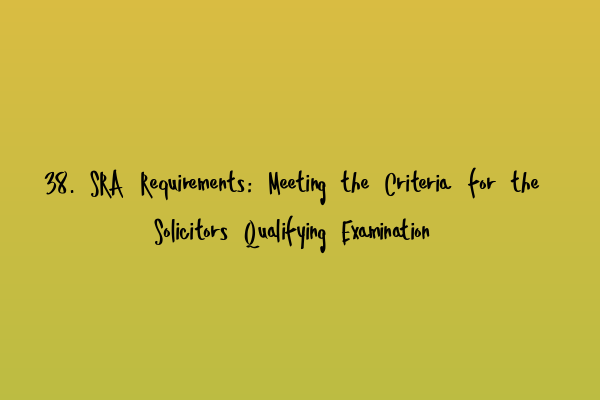38. SRA Requirements: Meeting the Criteria for the Solicitors Qualifying Examination
Are you preparing to take the Solicitors Qualifying Examination (SQE) and wondering what criteria you need to meet? Look no further! In this article, we will break down the SRA (Solicitors Regulation Authority) requirements for the SQE and provide you with the information you need to successfully navigate this important milestone in your legal career.
1. Academic Stage
The first requirement for the SQE is to have completed either a qualifying law degree or a conversion course recognized by the SRA. This means that you must have a solid foundation in law before you can proceed to the next stage of the qualification process.
If you haven’t yet completed your law degree or conversion course, it’s essential to enroll in a reputable SQE 1 preparation course to ensure that you have the necessary knowledge and skills to pass the exam. These courses often include practice exam questions like the ones found in the SQE 1 Practice Exam Questions resource, which can be invaluable in helping you familiarize yourself with the format and content of the SQE 1 exam.
Additionally, consider taking advantage of practice mocks like FLK1 and FLK2 to further enhance your preparation. These can be found in the SQE 1 Practice Mocks FLK1 FLK2 resource and will give you the opportunity to simulate the real exam environment, improving your confidence and ability to perform under pressure.
2. Work Experience
The next requirement set by the SRA is the completion of at least two years of qualifying work experience (QWE) in a legal environment. This can include work in law firms, in-house legal departments, or even overseas legal practice. The purpose of this requirement is to ensure that candidates have practical experience in legal matters.
You may have already completed QWE prior to starting the SQE qualification process. However, if you haven’t, it’s crucial to secure placements or training contracts in a legal setting to meet this requirement. SQE 2 preparation courses, such as those offered at SQE 2 Preparation Courses, can provide you with the necessary guidance and resources to secure QWE placements efficiently.
3. SQE Assessments
Once you have met the academic and work experience requirements, you can move on to the SQE assessments. The SQE consists of two stages: SQE 1 and SQE 2.
SQE 1 covers substantive law and legal practice skills. It assesses your knowledge and understanding of the law through multiple-choice questions and written tasks. To excel in this stage, it’s crucial to enroll in SQE 1 preparation courses that will help you navigate the complexities of the exam. Consider joining an SQE 1 preparation course, such as the ones provided at SQE 1 Preparation Courses.
On the other hand, SQE 2 focuses on practical legal skills, such as advocacy, client interviewing, and case analysis. This stage assesses your ability to apply legal knowledge to real-life scenarios. To ensure success in SQE 2, it is imperative to enroll in SQE 2 preparation courses, which will equip you with the necessary skills and techniques to excel in these practical assessments.
4. SRA SQE Exam Dates
Lastly, it’s important to stay updated on the SRA SQE exam dates. Being aware of the exam schedule will allow you to plan your preparation effectively and ensure that you are well-prepared on exam day. You can find a comprehensive list of the SRA SQE exam dates at SRA SQE Exam Dates to help you plan your study schedule accordingly.
In conclusion, meeting the criteria for the SQE requires a combination of academic achievement, work experience, and successful completion of the SQE assessments. By enrolling in SQE preparation courses, utilizing practice exam questions and practice mocks, and staying up to date with exam dates, you can effectively navigate the requirements and achieve success in your journey toward becoming a qualified solicitor.
